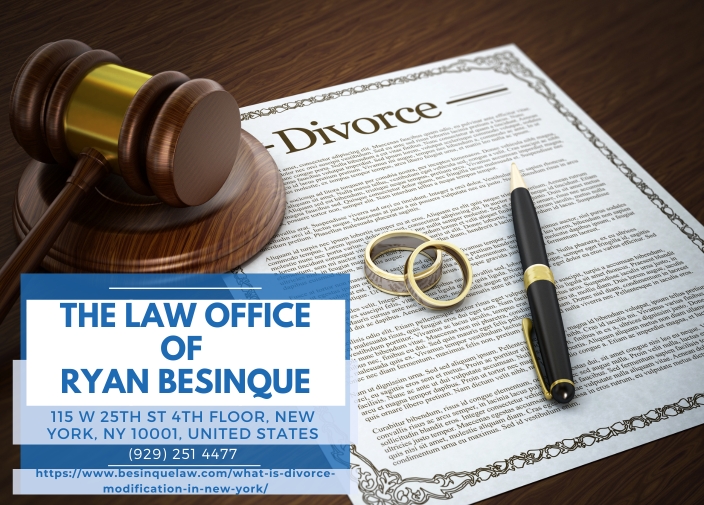A finalized divorce order is often seen as the conclusion of a legal chapter, but for many in New York, the story continues. Life changes can render original divorce terms unworkable. According to New York City divorce attorney Ryan Besinque (https://www.besinquelaw.com/what-is-divorce-modification-in-new-york/), understanding how to request a divorce modification is essential for those whose post-divorce realities no longer align with court-issued judgments.
Divorce modifications offer an important legal route for parties seeking to update support, custody, or other enforceable terms. New York law permits these changes when substantial shifts in circumstance occur. As a New York City divorce attorney, Ryan Besinque guides individuals through this often misunderstood legal process, helping them identify whether they meet the legal criteria to request changes to their existing agreements.
The Law Office of Ryan Besinque has worked with individuals across New York City dealing with unexpected post-divorce challenges. The firm emphasizes that a divorce decree is not always the final word, especially in cases involving child custody, child support, or spousal maintenance. The legal avenue of divorce modification allows former spouses to adapt the terms of their agreement when it no longer suits the evolving needs of their families. For those facing such issues, working with a New York City divorce attorney may provide clarity and direction through what can be a legally rigorous process.
Divorce modifications, also known as post-judgment or post-decree modifications, are not blanket rewrites of original divorce terms. Courts in New York will not revisit property division after the divorce is finalized. However, adjustments can be made to critical areas such as custody arrangements, child support obligations, and spousal support. These changes must be justified with compelling evidence that a meaningful and enduring shift has taken place in the petitioner’s life.
Common catalysts for requesting a modification include a substantial change in income, parental relocation, remarriage, evolving child needs, or even a decline in a parent’s physical or mental health. Ryan Besinque notes that modifications are not granted for minor inconveniences or short-term difficulties. The change must significantly impact a party’s ability to meet existing obligations or alter what is considered fair and reasonable under current conditions.
“Courts in New York require a high threshold of proof before modifying a divorce order,” Ryan Besinque explains. “Petitioners must demonstrate a substantial change in circumstances and, when custody or visitation is involved, show that the change serves the child’s best interests.”
The legal process for requesting a post-divorce modification begins with filing a formal petition or motion in the same court that issued the original judgment. This must be followed by serving notice to the other party and attending a hearing, if needed. Evidence such as employment records, pay stubs, medical documentation, or school reports should accompany the petition to strengthen the case. If the request meets the required legal standards, the court may issue a new enforceable order to replace the original one.
Custody and visitation changes are assessed based on the child’s best interests, with courts prioritizing continuity, emotional and physical well-being, and the strength of the child’s relationship with each parent. For financial support changes, New York statutes recognize specific grounds for review, such as a 15% income fluctuation or the passage of three years since the last order was modified. Importantly, courts distinguish between good-faith changes and voluntary actions like quitting a job to lower support obligations.
Divorce modifications are distinct from enforcement actions, which are used when a party fails to comply with the original order. While enforcement compels adherence, modification seeks to alter future obligations due to evolving circumstances. In some cases, both routes may be pursued simultaneously—one to enforce existing responsibilities and another to address current financial or custodial realities.
Choosing the right court for filing a modification request depends on the nature of the issue. For support or custody, Family Court often has jurisdiction and is typically more accessible. However, the Supreme Court handles issues tied to the original divorce decree or when multiple matters are combined in one motion. Filing in the correct venue avoids unnecessary delays or procedural setbacks.
Understanding which legal path to take—and navigating it efficiently—can be difficult without legal support. That’s why many turn to Ryan Besinque and The Law Office of Ryan Besinque when faced with substantial changes after a divorce.
For those in New York City experiencing financial upheaval, relocation, or a shift in family dynamics, a divorce modification may provide the legal structure needed to reflect a new reality. Filing with clear documentation and understanding the legal standards involved can make the difference between approval and denial.
Those navigating these post-divorce challenges are encouraged to take action early. Delays can complicate matters, especially when financial or parenting concerns are urgent. A properly filed and supported petition may lead to a new, court-approved arrangement that better aligns with current life circumstances.
About The Law Office of Ryan Besinque:
The Law Office of Ryan Besinque represents clients in New York City seeking legal guidance on family law matters, including divorce modifications. Led by Ryan Besinque, the firm assists clients through the process of updating custody, support, and other terms of a divorce judgment when significant life changes occur.
Embeds:
Youtube Video: https://www.youtube.com/watch?v=G4W5VBdIr_M
GMB: https://www.google.com/maps?cid=3422990479581259264
Email and website
Email: ryan@besinquelaw.com
Website: https://www.besinquelaw.com/
Media Contact
Company Name: The Law Office of Ryan Besinque
Contact Person: Ryan Besinque
Email: Send Email
Phone: (929) 251-4477
Address:115 W 25th St 4th floor
City: New York
State: New York 10001
Country: United States
Website: https://www.besinquelaw.com/

